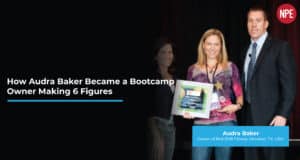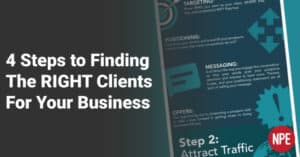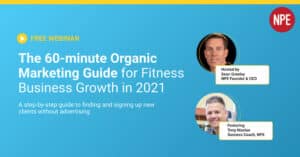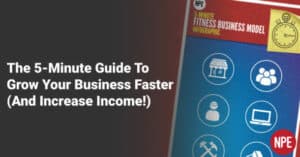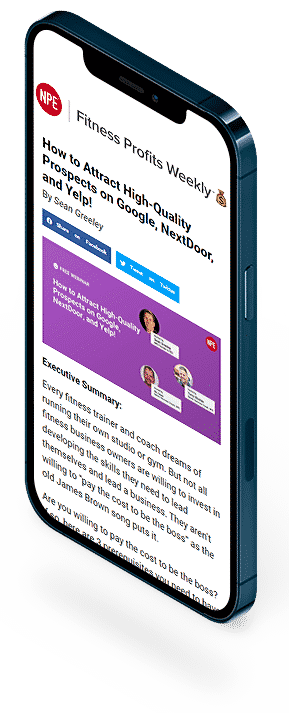Ep. 6 - Karry Summers - How Karry Grew from Part-time Trainer to 6 Locations Gym Franchising
- How Karry was unclear about her numbers, not having a membership system in place, and struggled to pay herself consistently
- How she decided to turn her passion for the pole dance community into a business and joined NPE
- How Karry overcame her issues with staffing to create a great team that allowed her to step outside of the day-to-day operations
- How she grew from 2 to 6 locations through her franchise campaign
- Her biggest challenge with time management between mother duty, training, and running a successful business (and how she truly ‘does-it-all’)
- Maintaining her health to compete and win one of the national pole dance contests in the midst of all the challenges and growth
- Her biggest breakthrough overcoming her fear of taking risks and creating a community within her team, franchisees, and clients
- How she’s excited and hopeful to grow beyond New Zealand and expand internationally
- And much more…
Get More From This Episode
Fill out the form below to get the FREE WORKSHEET
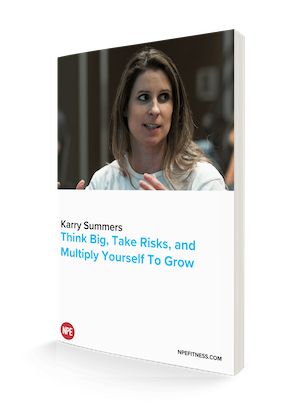
Answer a few short questions on our downloadable worksheet and apply this episode to your life and your business. You’ll remember more of what you learned and have clarity for how to put it to use right away.
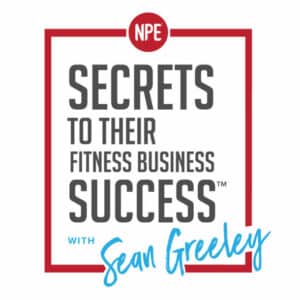
Secrets To Their Fitness Business Success Podcast
Podcast Transcript
Ric Isaac: Well, hi everyone and welcome to another one of our super exciting student interviews. We’ve got an amazing story to share with you here with Karry, and she’ll explain more about it as we go on. It’s an incredible adventure story if you like, in terms of growth with business. Karry having started off in in quite a modest situation, but has now got to a much, much bigger stage both metaphorically as well as physically as well in terms of the stage.
So before I steal any of your thunder, Karry, tell us a little bit more about you, where you’re from and your business model and clients that you serve.
Karry Summers: Yeah. So yep. Hi everyone. So my name’s Karry. I’m based in Christchurch, New Zealand. So a little bit further away I think than most people in the NPA. And I run Altitude, Pole, and Fitness, so we’re kind of a pole dance fitness studio and then we also do supplementary classes around that. So our core business is anything that’s a little bit trendy, a little bit fun to do with fitness.
We like to make the focus more on getting our students’ confidence up and making them really proud of what they can do rather than what they look like. So we don’t focus on weight loss or anything around that. It’s more learning some cool skills on the pole or the silks or the hoop and just, yeah, getting people a community that they can really thrive in and start feeling proud of themselves and very supportive kind of place. Yeah.
Ric Isaac: Well I love it. And you’ve really got some clear target markets, don’t you? In terms of who is your ideal client, share a little bit of that with us.
Karry Summers: Yeah, so it’s probably with pole dancing it’s very much a female-dominated sport or industry I guess, so definitely the way we’ve priced ourselves, we target those young professionals, so not necessarily students. Probably from 25 to 35 year old females. And that’s quite an easy market to get in front of, which is quite useful with social media these days. So that’s really handy for us.
But there’s also definitely a lot of older people that do it and we’re getting more guys into it. So some of the parkour people and the extreme sports and snowboarding, they join us more for the silks aspect and then secretly transitioned to pole once they feel a bit more comfortable about it. But yeah, it’s a wide market that we reach, but it’s a very easy one to dominate and to target in terms of who it definitely attracts.
Ric Isaac: Oh, I love it. I love what you said there as well about being not only fun but at building that sense of community and having had some prior knowledge as to what you do and how you do it. That’s really what you’ve been able to create, it’s the experience that your clients get is so supportive that even that alone is worth some continuing invest with you and continuing to get that support as part of that community, which is just super powerful.
So let’s talk a little bit about where you were prior to NPE, so before you found us, talk to us about what the facility looked like then, how many team payers did you have and where were you at with the business at that stage?
Karry Summers: Yes. It had probably been about three years ago now, that that might be faster than I realize that I basically had two studios myself. So one in Christchurch and one in Auckland, North Shore. I had just had my first child and was basically running this hobby business, because pole dancing is something that a lot of people are very passionate about, and I was very passionate about and I knew how to teach a pole, and I could write really good curriculums. But in terms of running a business, I had no idea what I was doing, and the studio had all right numbers for the students that we had in, but we didn’t have any sort of membership system. It was a pay as you go, casual, buy a 10 pack of … system.
So I had no numbers to work off, but yes, signing up to NPE and, and you guys made me fill out this form of how many leads do we get a month, and how many members do we have? And I couldn’t answer anything. So it was very inconsistent. While it was quite a successful studio in terms of its name in New Zealand, because we did quite well at competitions with holdouts competitions because we could teach our students well, there was no consistent income. I had a lot of instructors doing one or two hours each on top of their full time jobs. And so they were doing it just for fun as well. So I couldn’t really rely on them as much as I needed to, but I kind of just, it got to the point that I accepted the fact that it was just something I was doing for fun, and I loved it. So I was okay with not making money off it.
But it was definitely getting to a point where I knew I couldn’t continue forever like this, and something was going to give. I either had to make it work financially and make it worthwhile and free up myself a bit or it was going to suck out all of the joy and all of the passion that I had for pole, which would have been heartbreaking looking back at now, if I’d have got to that place. It would have really ruined me.
Ric Isaac: Well, I was fortunate enough to be part of those early conversations that we had together, and I remember you explaining to me that since you had your child, that was really starting to happen for you. It was becoming a chore and rather than a joy, and because there was no financial reward from it, there was this growing feeling of just, “All right, why am I even doing this?” And it was a make or break at that time.
So we spoke about it specifically then, and I know you talked about, well do we even continue? I mean you had thoughts of that stage of just pulling the plug all together, right?
Karry Summers: Yeah. Well it kind of got to that point. I knew that if I continued the way I was going, then it would be something that I ended up hating, and I didn’t really want to get to that point. And I guess there was always the option of going back to a full time job and getting paid by someone else and no stress and money coming in. And that was the choice I was facing, giving it all up and all the years of hard work for just a good ride, basically.
Ric Isaac: Well, I know you spoke at the time as well that you were really passionate about helping people in the pole community, because even though it was even newer and it’s still relatively new, I guess in terms of industry terms, one of the things that you recognize back then was just how empowering it was to be in a supportive and create a supportive environment, especially for that demographic who are often not really supported in other aspects of their lives. And you were passionate about doing that on a bigger scale, but you just couldn’t seem to make it work beyond the two. And the thought of doing more was terrifying, because then it would meant you doing more, right?
Karry Summers: Yeah. I don’t think I even considered there might be a third or fourth at that stage. I think just being able to make two work would have been the epitome of what I could have achieved back then. But yeah, definitely as the kind of people we get in, it forms a really deep family at each studio, and you see it at all pole studios, it’s definitely not just Altitude. I think we’ve just identified that really well, and worked on it until it’s systemized now, creating that community, but to shut down studios would have been heartbreaking for so many people. And you do, you see so much how much it helps people, not just physically but mentally. And to be able to bring that to more people has been amazing. It’s been such a good part of this whole journey.
Ric Isaac: Well you’ve certainly been able to bring it to more people, that’s for sure. And that’s what I wanted to talk to you. We talked about where you were and the stressful situation, new baby, just running it as a hobby, not making any money, losing your passion and feeling as if you’re going to start to hate it soon.
So where are you now? What do things look like from an altitude perspective? Pardon the pun right now.
Karry Summers: Oh, completely different. And like I said, where we are now wasn’t even part of the plan back when I joined NPE. When I joined, it was just to get two studios working in a way that I could live my life. So now we’ve got six locations around New Zealand, so I still own the face one in … and the second one, and then the other four franchises.
About eight months ago, maybe, August last year, we launched our franchise campaign, and it’s really grown way faster than I would’ve expected. And I think my focus has changed from originally, we were saying my focus was helping those students find themselves and grow into somebody that they deserve to be. But then I started saying what I’ve got out of owning a studio and the lifestyle I have of having this business that I love to the core and it actually does provide me with this amazing lifestyle.
And I wanted to start providing that to people, because I knew so many people who either wanted to open a studio or had opened a studio, and they were in the same position as me. They were doing it for the love and just couldn’t make it work. And couldn’t even give up their day jobs.
So yeah, my focus has definitely switched to helping people have a business that serves them and that they are just incredibly passionate about, and so we’re on to six locations and soon we’re going to start the next round of looking for the next lot of people. We’ve got a couple more kind of lined up, and it’s really exciting to take that whole pole thing and move it in a different direction for me, and see a different side to it with the owners of studios now.
Ric Isaac: As I said at the start, this really has been- This is an adventure story. You’re the equivalent of the Laura Croft of the pole world. You haven’t just done this without anything else happening in your life, either. Right? Having your first child, what else has happened personally for you during that last sort of three and a bit years?
Karry Summers: Yeah. So a year ago I had my second child, and I think that was definitely… I don’t know if milestone is the right word, but an eyeopener because when I joined NPE at that point, having a second child would have just been impossible, because I couldn’t have taken the time off to run the business and have a second child. So being able to have a second child and take that three months off when I had him, and the business not just sustained itself, but it actually continued to grow while I was doing nothing, and I managed to pass my government maternity leave onto my husband. So he had three months off paid as well.
And yeah it was amazing. And that’s the kind of lifestyle that is really what I want to pass on to other people that this is possible. And then yes, since then we’ve moved studios. So for my Christchurch studio, the original, we moved into a new location because we outgrew the old one. We hit capacity, and we went, I was just going to go double in size to a big two room studio, and then walked into this place and it was four times as big, and it was a big scary decision and nothing I planned for. But I saw it, and I was like, “Yes, let’s do it.”
So opened up this new location that’s four times bigger than my old one, and within a year we’d hit capacity there as well and we’re sitting at capacity at that one as well now. So there’s definitely been a lot going on. Yeah it’s been an adventure, a really cool one.
Ric Isaac: It’s incredible to look at it, because we’re talking a really short space of time here. It’s three and a half years, not quite, and you’ve gone from having two, which were essentially hobbies that were stressful hobbies of that as well, because you had all the usual dramas with staff and with clients and with marketing and with sales and business management that anyone has anyway, feeling that you were going to really lose your passion for and end up hating it, and then you’re in a situation where you’re not only leaving your passion, but you’re also able to create a lifestyle for yourself and you’re now doing that with the people who are investing with an Altitude franchise too, which is super exciting, and it’s incredible what you’ve been able to achieve.
Now I do want to talk to you about some of the challenges, because I know that you’ve had them along the way. What would you say since joining with us and working through it, and I know you do love a challenge as well, and we’ve done that repeatedly with you with the continue to challenge you to think outside the initial plan because of your skills and dedication to it. What have been some of the biggest challenges for you that you’ve faced, Karry? And share what that’s been like for you.
Karry Summers: I think for me personally, it was always just my time management. With one kid and now two kids and a big part of moving forward with this lifestyle was finding my own time to do training, because training for pole was something I’m really passionate about as well. And I don’t want to lose that just because I own a studio or whatever. And so I always set myself a goal of not doing more than 20 hours a week.
So every point of the way, it’s definitely been a challenge, but I think it’s also what created this amazing business system, because I had to hire people and all the roles where it wasn’t worth me doing those tasks. And I had to get very clear on what those roles were and then very clear on how to train people up and how to keep track of how they were performing in those roles and how each section of the business has been performing.
So it’s really forced me to systemize everything and create this business model that I know works. And I think that’s why the franchise systems are doing so well, is because I had to personally keep this business running without me in it too much.
I think that’s been a challenge, because every step of the way, it’s been very tempting to drag myself back into it. And when I decided to franchise, it was one of the things I had a big discussion with my husband over. I was like, “If we’re going to do this, then yeah, I’m going to try and make sure I don’t do it without me sucking back into the business and losing all my time again,” because the goal and having this end goal of a hundred franchises or whatever it is, is awesome. But if I don’t enjoy the process, then there’s absolutely no point. And I think that’s what I really learned from back in the day that you’ve got to enjoy your life and enjoy the whole process. The goal is just pointless otherwise.
The time management has been a big one for me and every step of the way, almost every week I have to reassess what I’m doing and just be like, “Is this worth it for me to be doing or can I get someone else doing this?”
And then how do I measure that? And then not being in the business, just making sure there was a good way to keep track of how the business was doing so I didn’t lose sight of everything. So my time is pretty much just step in and meetings now, which is slightly frustrating, but also it’s good because I can kind of basically say, “This is what I want happening and tell me what’s going on.” And then it goes and gets done, and I’m no longer bottle necking any of the processes, but it been a longer time before I got to draw in a decent income from the studio I guess was another challenge. But that was a decision I made that I would prefer. And it’s worked out in the long run really well, I think, going down that path. Yeah, it was a challenge, but it’s definitely been something that I’ve kept focus on and ended up being a positive.
Ric Isaac: And I think you’ve highlighted two really important things there for everyone listening to this call, because there’s often a fear of growing bigger and having to do more. If I get even busier, if I’m more successful, or even if I start to become successful, will I have to do even more work? Because that perception often holds people back. And I’m sure there’s a bunch of people listening to this going, “Yeah. That’s where I’m at. The thought of growing and having to do more, I’m already doing so many hours.”
So I think there’s a couple of things that I love what you were saying, you had to structure, you already had one child who’s not, they’re not 15 yet. They’re only three, so there’s still a lot of time requirement there. And so you had to structure the business in a way that you weren’t doing so many of those tasks that so many business owners just take on board themselves, because they don’t want to pay for someone else to do it. There’s not quite enough money in the business anyway. So they end up getting stuck doing administrative tasks and manual things. So you being able to work on a system for that’s really powerful.
Karry Summers: Yeah, it’s definitely paid off, and I think it was really scary because you do, you look at the income and you’re like, “Oh I don’t really know if I can afford this person.” But it’s always such an investment, and every time I’ve done it it’s paid off in the long run because it’s allowed the business. And I think that is why things have happened so fast, because it hasn’t been down to one person doing it. I’ve built an amazing team and pretty much quadrupled the amount of stuff that can get done rather than me doing everything. But yeah, it’s definitely been a challenge holding on to that same control while giving up the balance there.
Ric Isaac: Well that’s a great point. I wanted to touch on that, because there’s a lot of people who again, are stuck because they’ve either tried to get someone else to do it in the future and it hasn’t worked and the whole, “Well I’ll just do it myself then. I can’t trust anyone, so I’ll just do it,” but you really made a line in the sand there and refuse to be dragged back into it, as you said. How has that been for you? Because you have to give up some control while you’re trying to keep some control as well.
Karry Summers: Yeah. Yeah. And I think it was hard to start with, whereas now, I don’t know if I’ve gone the other way and I’ve got really lazy with things, but definitely the people I’ve hired and I found some amazing people who have strengths in areas that I don’t. So it’s been really good to be able to take those things that I know I’m not good at and give them to someone who I know is really good at it.
And then I just focus on the big picture. And then again, we’ve come up with a really nice way of basically tracking the business and numbers, so I can open a spreadsheet and everything from all over areas of the business are collated in this one spreadsheet, and then they’re color coded, green, orange, red. So it’s very easy to get a quick snapshot of how the business is doing and then jump straight in and talk to the person whose area that is and still keep that control that way.
And again, that’s worked really well for the franchisees as well, because not only can they build a company that they will eventually get out of or they start out of it completely, but we can talk to them every couple of weeks and go over these numbers with them and it that can make everyone aware of what’s going on and how it’s tracking and just make things a bit proactive rather than reactive with the businesses, which is really important.
Ric Isaac: So let me just clarify, here. You’ve gone from essentially no numbers, and I remember on our first call when I was saying, “Oh well how many leads?” You’re like, “A few.”
Karry Summers: I didn’t know what a lead was.
Ric Isaac: And to now knowing the numbers to the enth degree. How much has that? Because a lot of people are scared of the numbers, right? We either don’t want to track them. It might be they don’t want to look because they don’t want to look good. How has that been empowering for you just knowing exactly what all the metrics are in the business?
Karry Summers: So important, because that is exactly what has allowed me to step out. If I didn’t have that, I would have lost control of what was going on. Being able to look at a single spreadsheet, and we’re adding to numbers all the time and adapting what those numbers are and tweaking what we need to know. And it’s definitely an ongoing process of there might be a line in that spreadsheet that we don’t look at. So we get rid of that and then we think what will be useful.
That is fully what has allowed both me to step out of the business as much as I have, but also with this whole franchise process to give confidence to the owners that both they can look back at what every other studio is doing. They can repair their studio against all the other studios, and we can fully see what’s going on at a high level and where the problems are. It’s been everything. I had no idea on the numbers when I fist started, and now I live by them, and I have just learned to love spreadsheets and make them work.
We’ve tried a few different systems for tracking them in dashboards but we just keep going back to spreadsheets. It’s just easier to manipulate them and work with them I think.
Ric Isaac: Well I guess once you’ve, and yours is an exciting story of adventures we keep saying because you have taught yourself really how to recognize the numbers and how to enjoy them and not for them to become a nightmare, which is awesome.
You mentioned another thing there as well, which tends to happen to a lot of people in the industry, is that their own personal health ends up being sacrificed for the business, and for them to grow they end up just doing more and more and more hours, which obviously is what… You didn’t go down that path, which is why it’s so impressive, your growth and dramatic growth. And just recently, and I do want to bring this up because it’s really important. On the weekend, recently, you competed in the national championships, right? The New Zealand…
Karry Summers: Yeah. One of the national, there’s a few now. They’re growing.
Ric Isaac: And how long has it been since you competed?
Karry Summers: It’s been two years since I last competed internationally and five years since I last competed in New Zealand.
Ric Isaac: Gotcha. So a bit over three years ago you’ve got two facilities, you’ve just had a baby, life is going crazy. You’ve now grown incredibly in that period. Both your family, with having another child and also now getting to six facilities, and in the meantime you’ve also maintained your health and fitness and after not competing in New Zealand for the last five years, you’ve compete on the weekend then won.
Karry Summers: Yeah. Yeah. I can still the 20 year olds.
Ric Isaac: I mean that’s so amazing, Karry. And I know there’ll be a lot of people on this call thinking how did she do that? I can’t even get my own workout in once or twice, because I’ve got so much stuff to do. Whereas I think that, as you said, being able to delegate efficiently and making some of those smart decisions, getting people to help you so that you’ve only got some certain strengths that you’re aware of now and you get other people who’ve got strengths in the areas that you don’t. So that being said, and that’s super impressive. Congratulations. So excited for you and ….
What would your lessons learned, but your favorite lessons learned over the last three and a bit years of working with NPE? What are the biggest takeaways for you, Karry?
Karry Summers: Oh my God, there’s so many. I think definitely not being scared to take risks with the business. And I guess a big part of that is keeping it in perspective. I don’t know if this is quite the right thing I should be saying, but I’ve always thought every big step I’ve taken, I’ve always thought worst case scenario, lose business, go bankrupt. And then I’m like, well it’s not actually that bad. I’ve still got my family. Like we can rent a house, I have to sell a house, and I’ll go work at McDonald’s or something or do something new. It’s just what I’m doing right now with my life and it’s working right now. And if tomorrow it stops working, I’ve had a good time.
And so that’s allowed me to take a few big risks with the business, and push it a little bit further. And I’m not saying you have to be stupid about things, but it’s not everyone that can take those kind of risks. And I think if you can be that type of person who can, then that’s what’s going to put you ahead of other people and grow the business.
There’s been a lot of scary stuff happening, but also taking your advice, because like you were saying before with the health and fitness stuff, I’m sure everyone listening to this call has said that to their own clients when they’re trying to keep a member, and that member saying I need to cancel my membership because I’m really stressed out at work. I don’t have the time. And I say over and over to our members who say that, the first thing you let go of is your health and fitness, when really that should be the first thing you hold on to, and things are getting stressful, you need to make that a priority.
So if you’re saying that to someone else, you know the answer, you just got to listen to it yourself. And it can be very counterintuitive to hire someone when you don’t think you can. But again, it just allows things to move at a quicker pace. As long as you hold onto those people well and treat them well and you do good hires. I guess that’s the other big lesson. There’s so many lessons. I don’t even know if there’s been one, it’s just an endless thing of stuff that I’ve learned and some things have worked, some things haven’t. Definitely for me, hiring people and creating an amazing team has been my biggest achievement, I think. …
Ric Isaac: That’s been impressive as well. I know that we have challenges with employees and with staff, because that’s just part of running a business, and it’s a part of managing and working with people.
Some of those challenges that you had when it was more of a hobby, you still face occasionally but you’ve got such a great communication process now with all of your team and all of your franchisees as well that they continually feel supported, they feel recognized, they get rewarded. You’ve really built not only a community for your clients and your franchisees as clients, but you’ve built a community for the franchisees and your staff members as well, so that they’re just loving the business as much as you are. Right?
Karry Summers: Yeah. Yeah. Hope so, and that’s definitely been another challenge, because obviously as team has grown, trying to remember those ones in the widest circle that I don’t necessarily see every day. We’ve built it into the system that we have the instructor socials every two months and all the franchisees have to do the same, because it is important that you have an amazing environment for your workers as as well. That’s who face your students and your clients everyday. So if they’re not loving the job, then they’re not putting out a good vibe there.
So yeah, basically, everything we’ve done around that, we had tried to systemize and actually build it into processes of how do you treat your staff and what are you doing? Then how are you rewarding them? And it’s definitely been an area that we’ve had to work with because we’ve grown so fast that bringing them along with us and making sure they didn’t get scared by how businessey we got was a big part of our journey or still is really, because it’s a very different place now as to what our instructors signed up to three, four years ago. That communication has had to be really strong and open and not letting them get too scared that we’re getting too corporate or anything.
Ric Isaac: We talk about recognition and reward being the two most motivating factors when it comes to staff and probably the biggest challenge and a downfall, a lot of those small to medium businesses trying to get bigger is a lack of communication from the vision of the owner all the way down to that newbie staff member who’s just trying to learn how to do a good job.
And I think what you said earlier is fantastic as part of that, because you had to remove yourself from the business, you had to put the right systems in, and using the BMP tools and processes so that you could empower your team to perform in the business just as if it was their own, and then you can manage the numbers and do the things that you do well and be in the meetings and support that continued growth and really drive that longer and bigger vision knowing that they’ve got the right tools and systems to use themselves.
Karry Summers: Yeah. Yeah, definitely. And I guess the thing with that is the newer instructors and the newer teammates that we’ve brought on, we’ve gotten much better at onboarding them the right way and having those sit downs with me so they get the vision, and I think it really highlights just the better way of doing it, and it is because our people, our instructors who’ve been with us for longer, who didn’t get any of that when they first joined, are definitely more not scared but yeah, struggling more with how it is now. And it just highlights the difference between onboarding people correctly and giving them the time. Yeah.
Ric Isaac: Yeah. It’s powerful stuff. Well, look, it’s been amazing to watch your journey. I know this is just the start because you’ve got some bigger plans too, right? I’m not sure whether we’re allowed to talk about that, but it’s continued growth not just with the existing six, right?
Karry Summers: Yeah. Well I think New Zealand is on only so big, and I definitely don’t want to step on any tours of current studios that are open here, and there’s only so many cities that can sustain a lot of studios. So we’re definitely going to outgrow New Zealand soon, so starting early next year at the end of this year, then I want to start looking internationally for some more studio spaces over there. I think this business model is just so good, and we’ve really proven that here in New Zealand now in getting our numbers right, that I want to provide this lifestyle to more people. And so I think to do that and moving over to the states or UK will be where we start looking next, and I’m really excited about that, because that’s going to just open up so many more opportunities for people and see this pole dancing thing grow.
Ric Isaac: Yeah. And create that community, it’s fantastic to see your development and growth into that worldwide visions can be very exciting, and you’ve certainly done incredible things in the last three and a bit years. I can only imagine what’s going to happen in another not literally two, because you just keep getting quicker and quicker. This isn’t slowing down, which is awesome.
So I know we spent some time looking at talking about a bunch of things just to sort of bring all this in for a landing here. What would your advice be for others who are listening to this story and maybe have a business already or maybe thinking about growing one and developing one or wanting to really take theirs to the next level. What would your advice be for those who are listening to this story, Karry?
Karry Summers: Oh God. Again, where do I start? I think a big part of it, definitely for me, was just to believe what was possible and to always think bigger, because when you’re in that struggling space, all you’re trying to do is get out of it and have that one studio that works, and that’s awesome, but I think if you 10X your goal as Grant Cardone would say, then it makes everything just seem a bit more achievable.
If you think nah, one studio, it’s doable for anyone. It’s the same process. It really is just a blueprint model that you follow and it will work for any business. You just need to know what that blueprint is and that formula is, and that’s what NPE have shown me. It’s the same things that everyone, you look at the numbers, you do the right things, and your business will work, and it’s really not magic or luck or anything. You just follow the process. And then as soon as you stop thinking that the big highlight is one successful studio and you start thinking bigger, then the one successful one isn’t scary anymore. It’s totally doable, and you just need to change that mindset a bit. Yeah. Although the instructions isn’t that what you guys said?
Ric Isaac: That’s exactly-
Karry Summers: I’m pretty sure I’ve got that written somewhere in one of my NPE notebooks.
Ric Isaac: Absolutely. Client success, principle number six, follow the dang instruction. You hit the nail on the head, well done Karry.
Ric Isaac: It’s awesome, and it is super exciting to see your growth and I love what you’ve been able to achieve, and you’ve been such an amazing part of our community as well and you’re inspiring so many other people to think bigger and to have a clear vision themselves and to have a bigger goal that they’re working towards as well.
Thank you so much for your time today. I know there’s going to be a bunch of people inspired and probably wondering how they can get in contact with you as well for those opportunities down the track, which would be great to see.
We love having you in the community and we can’t wait to continue to support and help you to achieve those big vision and those big goals that you’ve got. So thanks again, Karry. You really are a true inspiration.
Karry Summers: Thanks, Ric. Thanks to you guys, this is where I am. I wouldn’t be here without NPE. That’s 100% true.
Ric Isaac: Well congratulations. I’m sure we’ll get updated in a few months time, because you’ll probably have to put a one at the front of those six. But congrats on what you’ve done so far, and enjoy the rest of your time with your beautiful family, and we’ll speak to you again very soon, Karry.
Karry Summers: Thanks, Ric. See you.
Ric Isaac: Take care.
Karry Summers: Bye.

